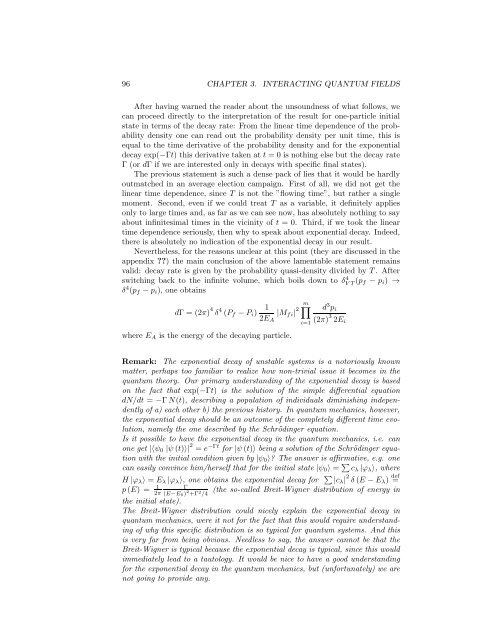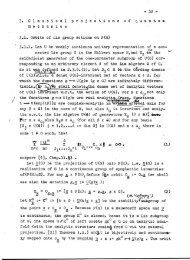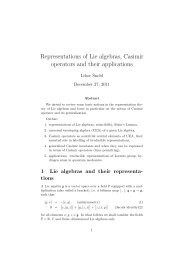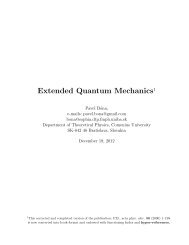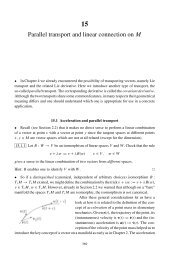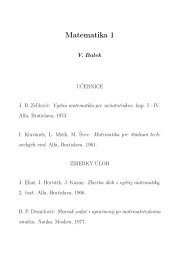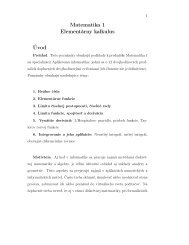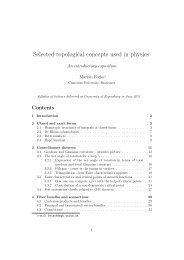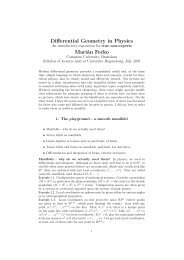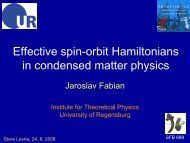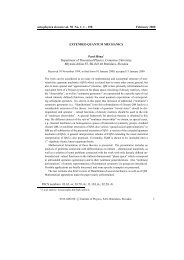Quantum Field Theory I
Quantum Field Theory I
Quantum Field Theory I
Create successful ePaper yourself
Turn your PDF publications into a flip-book with our unique Google optimized e-Paper software.
96 CHAPTER 3. INTERACTING QUANTUM FIELDS<br />
After having warned the reader about the unsoundness of what follows, we<br />
can proceed directly to the interpretation of the result for one-particle initial<br />
state in terms of the decay rate: From the linear time dependence of the probability<br />
density one can read out the probability density per unit time, this is<br />
equal to the time derivative of the probability density and for the exponential<br />
decay exp(−Γt) this derivative taken at t = 0 is nothing else but the decay rate<br />
Γ (or dΓ if we are interested only in decays with specific final states).<br />
The previous statement is such a dense pack of lies that it would be hardly<br />
outmatched in an average election campaign. First of all, we did not get the<br />
linear time dependence, since T is not the ”flowing time”, but rather a single<br />
moment. Second, even if we could treat T as a variable, it definitely applies<br />
only to large times and, as far as we can see now, has absolutely nothing to say<br />
about infinitesimal times in the vicinity of t = 0. Third, if we took the linear<br />
time dependence seriously, then why to speak about exponential decay. Indeed,<br />
there is absolutely no indication of the exponential decay in our result.<br />
Nevertheless, for the reasons unclear at this point (they are discussed in the<br />
appendix ) the main conclusion of the above lamentable statement remains<br />
valid: decay rate is given by the probability quasi-density divided by T. After<br />
switching back to the infinite volume, which boils down to δ 4 V T (p f − p i ) →<br />
δ 4 (p f −p i ), one obtains<br />
dΓ = (2π) 4 δ 4 (P f −P i )<br />
1 ∏<br />
m<br />
|M fi | 2<br />
2E A<br />
where E A is the energy of the decaying particle.<br />
i=1<br />
d 3 p i<br />
(2π) 3 2E i<br />
Remark: The exponential decay of unstable systems is a notoriously known<br />
matter, perhaps too familiar to realize how non-trivial issue it becomes in the<br />
quantum theory. Our primary understanding of the exponential decay is based<br />
on the fact that exp(−Γt) is the solution of the simple differential equation<br />
dN/dt = −ΓN(t), describing a population of individuals diminishing independently<br />
of a) each other b) the previous history. In quantum mechanics, however,<br />
the exponential decay should be an outcome of the completely different time evolution,<br />
namely the one described by the Schrödinger equation.<br />
Is it possible to have the exponential decay in the quantum mechanics, i.e. can<br />
one get |〈ψ 0 |ψ(t)〉| 2 = e −Γt for |ψ(t)〉 being a solution of the Schrödinger equation<br />
with the initial condition given by |ψ 0 〉 The answer is affirmative, e.g. one<br />
can easily convince him/herself that for the initial state |ψ 0 〉 = ∑ c λ |ϕ λ 〉, where<br />
H|ϕ λ 〉 = E λ |ϕ λ 〉, one obtains the exponential decay for ∑ |c λ | 2 δ(E −E λ ) def<br />
=<br />
p(E) = 1<br />
2π<br />
Γ<br />
(E−E 0) 2 +Γ 2 /4<br />
(the so-called Breit-Wigner distribution of energy in<br />
the initial state).<br />
The Breit-Wigner distribution could nicely explain the exponential decay in<br />
quantum mechanics, were it not for the fact that this would require understanding<br />
of why this specific distribution is so typical for quantum systems. And this<br />
is very far from being obvious. Needless to say, the answer cannot be that the<br />
Breit-Wigner is typical because the exponential decay is typical, since this would<br />
immediately lead to a tautology. It would be nice to have a good understanding<br />
for the exponential decay in the quantum mechanics, but (unfortunately) we are<br />
not going to provide any.


